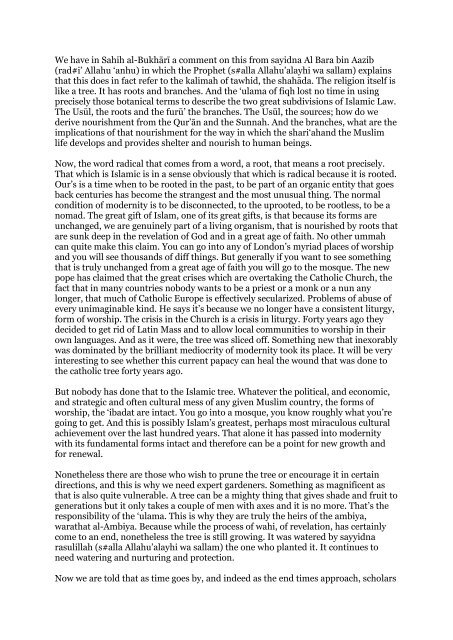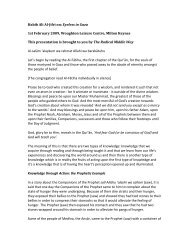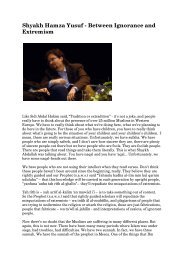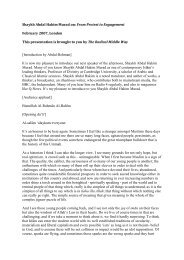PDF Transcription Shaykh Abdul Hakim Murad - Radical Middle Way
PDF Transcription Shaykh Abdul Hakim Murad - Radical Middle Way
PDF Transcription Shaykh Abdul Hakim Murad - Radical Middle Way
You also want an ePaper? Increase the reach of your titles
YUMPU automatically turns print PDFs into web optimized ePapers that Google loves.
We have in Sahih al-Bukhārī a comment on this from sayidna Al Bara bin Aazib<br />
(rad#i‟ Allahu „anhu) in which the Prophet (s#alla Allahu‟alayhi wa sallam) explains<br />
that this does in fact refer to the kalimah of tawhid, the shahāda. The religion itself is<br />
like a tree. It has roots and branches. And the „ulama of fiqh lost no time in using<br />
precisely those botanical terms to describe the two great subdivisions of Islamic Law.<br />
The Usūl, the roots and the furū‟ the branches. The Usūl, the sources; how do we<br />
derive nourishment from the Qur‟ān and the Sunnah. And the branches, what are the<br />
implications of that nourishment for the way in which the shari„ahand the Muslim<br />
life develops and provides shelter and nourish to human beings.<br />
Now, the word radical that comes from a word, a root, that means a root precisely.<br />
That which is Islamic is in a sense obviously that which is radical because it is rooted.<br />
Our‟s is a time when to be rooted in the past, to be part of an organic entity that goes<br />
back centuries has become the strangest and the most unusual thing. The normal<br />
condition of modernity is to be disconnected, to the uprooted, to be rootless, to be a<br />
nomad. The great gift of Islam, one of its great gifts, is that because its forms are<br />
unchanged, we are genuinely part of a living organism, that is nourished by roots that<br />
are sunk deep in the revelation of God and in a great age of faith. No other ummah<br />
can quite make this claim. You can go into any of London‟s myriad places of worship<br />
and you will see thousands of diff things. But generally if you want to see something<br />
that is truly unchanged from a great age of faith you will go to the mosque. The new<br />
pope has claimed that the great crises which are overtaking the Catholic Church, the<br />
fact that in many countries nobody wants to be a priest or a monk or a nun any<br />
longer, that much of Catholic Europe is effectively secularized. Problems of abuse of<br />
every unimaginable kind. He says it‟s because we no longer have a consistent liturgy,<br />
form of worship. The crisis in the Church is a crisis in liturgy. Forty years ago they<br />
decided to get rid of Latin Mass and to allow local communities to worship in their<br />
own languages. And as it were, the tree was sliced off. Something new that inexorably<br />
was dominated by the brilliant mediocrity of modernity took its place. It will be very<br />
interesting to see whether this current papacy can heal the wound that was done to<br />
the catholic tree forty years ago.<br />
But nobody has done that to the Islamic tree. Whatever the political, and economic,<br />
and strategic and often cultural mess of any given Muslim country, the forms of<br />
worship, the „ibadat are intact. You go into a mosque, you know roughly what you‟re<br />
going to get. And this is possibly Islam‟s greatest, perhaps most miraculous cultural<br />
achievement over the last hundred years. That alone it has passed into modernity<br />
with its fundamental forms intact and therefore can be a point for new growth and<br />
for renewal.<br />
Nonetheless there are those who wish to prune the tree or encourage it in certain<br />
directions, and this is why we need expert gardeners. Something as magnificent as<br />
that is also quite vulnerable. A tree can be a mighty thing that gives shade and fruit to<br />
generations but it only takes a couple of men with axes and it is no more. That‟s the<br />
responsibility of the „ulama. This is why they are truly the heirs of the ambiya,<br />
warathat al-Ambiya. Because while the process of wahi, of revelation, has certainly<br />
come to an end, nonetheless the tree is still growing. It was watered by sayyidna<br />
rasulillah (s#alla Allahu‟alayhi wa sallam) the one who planted it. It continues to<br />
need watering and nurturing and protection.<br />
Now we are told that as time goes by, and indeed as the end times approach, scholars












